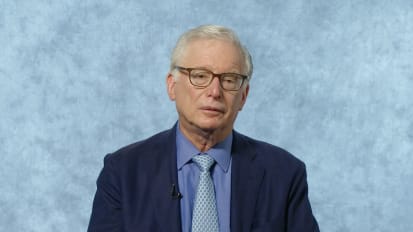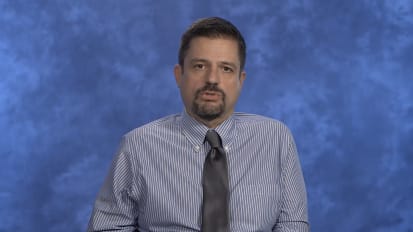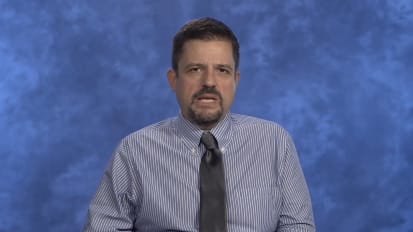ABOUT THIS PROGRAM AND FACULTY DISCLOSURES
Program Medium
Internet-based program
Method of Physician Participation Utilized in Learning Process
There are no fees for participating and receiving CME credit for this activity. During the period April 11, 2019 through April 11, 2021, participants must 1) read the learning objectives and faculty disclosures; 2) study the educational activity, and are expected to view all 45 segments, totaling 2.5 hours, to successfully complete the activity and earn CME credit; 3) register and complete the evaluation form and post-test; 4) score 100% on the post-test; and 5) print out CME certificate.
Estimated Time to Complete Educational Activity
2.5 hours. Physicians must study the enduring activity, and are expected to view every segment to successfully complete the activity and earn CME credit.
Course Overview
In this web-based program, physicians will learn how recent developments in basic and clinical research have helped to advance the understanding and application of extracorporeal photopheresis in appropriate hematologic and immune-related disease states.
Release Date
April 11, 2019
Expiration Date
April 11, 2021
Intended Audience
This complimentary CME educational activity is designed for all healthcare providers (HCPs) involved in developing, delivering, consulting, and monitoring care for patients with hematologic and immune-related disease states, including hematologists, oncologists, transplant surgeons, clinical immunologists, dermatologists, rheumatologists, and related clinicians), and related clinicians.
Registration
Participation in this iQ&A interactive Medical Intelligence Zone is complimentary, and clinicians are invited to view this CME-certified program and/or share this invitation with other colleagues, departmental staff members, and healthcare professionals.
Grantor Support
This activity is supported by an independent medical education grant from Mallinckrodt.
Accreditation Statement
This activity has been planned and implemented in accordance with the Essential Areas and policies of the Accreditation Council for Continuing Medical Education (ACCME) through the joint providership of the University of Massachusetts Medical School, Office of Continuing Medical Education and CMEducation Resources, LLC. The University of Massachusetts Medical School, Office of Continuing Medical Education is accredited by the ACCME to provide continuing medical education for physicians.
Credit Designation Statement
The University of Massachusetts Medical School, Office of Continuing Medical Education designates this enduring material for a maximum of 2.5 AMA PRA Category 1 Credits(s)™. Physicians should claim only the credit commensurate with the extent of their participation in the activity.
Policy on Faculty & Provider Disclosure
It is the policy of the University of Massachusetts Medical School, Office of Continuing Medical Education to ensure fair balance, independence, objectivity and scientific rigor in all activities. All faculty participating in CME activities sponsored by the University of Massachusetts Medical School, Office of Continuing Medical Education are required to present evidence-based data, identify and reference off-label product use and disclose all relevant financial relationships with those supporting the activity or others whose products or services are discussed. Faculty disclosure will be provided in the activity materials.
Program Faculty and Disclosure
Daniel R. Couriel, MD, MS
Professor of Internal Medicine
Director, Huntsman Cancer Institute (HCI) Blood and Marrow Transplant Program
University of Utah School of Medicine
Salt Lake City, UT
Nothing to disclose
Richard Edelson, MD
Aaron B. and Marguerite Lerner Professor of Dermatology
Chair and Professor
Department of Dermatology
Yale School of Medicine
Ownership interest (including patents) in, and is a consultant/advisory board member of, Transimmune, AG. Inventor of extracorporeal photochemotherapy
Ian Odell, MD, PhD
Assistant Professor
Dermatology Director, Adult Primary Care Center
Scleroderma and Myositis Program
Yale University School of Medicine
Nothing to disclose
Dr. Julia Scarisbrick
Consultant Dermatologist & Cutaneous Lymphoma
Lead at the University Hospital
Birmingham, UK
Nothing to disclose
Program Managers and Reviewer Disclosure
Gideon Bosker, MD and Denise Leary have nothing to disclose
Educational Objectives
Upon completion of this activity, participants will be able to:
- Recognize the clinical and therapeutic implications ECP for a number of disease states including CTCL, GVHS, solid organ transplant rejection (SOTR) and Systemic Scleroderma (SS)
- Identify the clinical triggers, treatment schedules, and safety monitoring strategies basis for deploying ECP in a number of disease states including CTCL, GVHS, solid organ transplant rejection (SOTR) and Systemic Scleroderma (SS)
- Outline the mechanistic basis of ECP—including the mechanisms leading to tolerizing vs. immunizing effects of ECP—and how these mechanisms explain the therapeutic effects observed in conditions that require either immune toleration (SOTR) or hyper-immunizing effects as in the case of lymphoid malignancies
- Detail the rationale for deploying ECP in the setting of combination pharmacologic therapies used for CTCL, GVHS, solid organ transplant rejection (SOTR) and Systemic Scleroderma (SS) and related conditions
- Compare and contrast the differences between open and closed ECP systems, including the evidence for clinical success among currently available ECP technologies, sensitizing agents, and related options
Hardware and Software Requirements:
To participate in this program, viewers must have a PC or Macintosh computer that has active, ongoing internet access for the duration of the program, as well as a compatible Flash-viewer. An email address is required for registration, and a printer is required to print out the CME certificate.
Privacy Policy
When you participate in a CME activity offered by CMEducation Resources, we ask you for your name, degree, affiliation, street address, telephone number, fax number, and/or e-mail address (the "Information"). We use that Information in the following ways:
- We use the Information to grade your post-test and to send you a certificate of completion of the CME activity. If we use a third-party company to grade your post-test and issue certificates of completion, we will give the Information to that company for that purpose only.
- For each CME activity that you take, you must complete an evaluation questionnaire. That questionnaire asks if you are willing to participate in a follow-up survey. If you answer yes, we will use your name and contact information to send you the survey.
- We may use the Information to send you information about other CME activities that CMEducation Resources is offering.
- If our company is acquired by or merged into another company, we may make the Information available to the new owner/entity to use in the ways described above, to enable it to continue our business.
- You should check this privacy policy periodically to see whether we have made any changes.
Disclaimer
Copyright © 2019 by CMEducation Resources, LLC All rights reserved.
Reproduction, distribution, or translation without express written permission is strictly prohibited.
Content on this webcast reflects the opinions, output, and analyses of experts, investigators, educators, and clinicians whose activities for, while independent, are commercially supported by the sponsor noted at the start of each activity.
Content on this webcast is not meant to be, nor substitute for national guidelines or recommendations generated by professional, academic societies, colleges, or associations.
Content on this webcast is intended for educational value only. Its contents, analyses, and any recommendation made herein are intended to make scientific information and opinion available to health professionals, to stimulate thought, and further investigation. This webcast is not designed nor is any aspect of the contents here intended to provide advice regarding medical diagnosis or treatment for any individual case. Any decisions regarding diagnosis and/or management of any individual patient or group of patients should be made on individual basis after having consulted appropriate sources, whether they be appropriate consultants and/or guidelines and recommendations issued by national organizations, professional societies, governmental health organizations, or similar bodies. This webcast is not intended for use by the layman.
Opinions expressed herein are not necessarily those of Pharmatecture, LLC, CMEducation Resources, LLC, program supporters or accreditors, but reflect the opinions and analyses of the experts who have authored the material. Mention of products or services does not constitute endorsement. Clinical, legal, financial, and other comments are offered for general guidance only; and professional counsel should be sought for all specific situations.

ECP in CTCL, GVHD, Solid Organ Transplant Rejection, and Scleroderma
Focus on the Evidence and Clinical Applications at the Front Lines of Patient Care

















